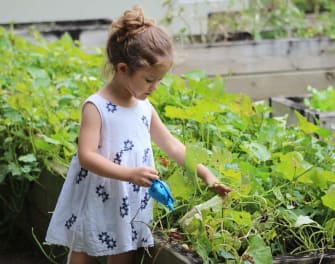Do you want to share your green thumb with your children? Great! Gardening is a truly beneficial activity for kids.
Gardening allows your children to create something beautiful; they grow flowers, vegetables, and a variety of different plants. Gardening also teaches children important life lessons, such as patience and responsibility.

But here's the issue: many children don't find gardening fun.
They're too distracted by television, video games, smartphones, and other forms of technology. If you're trying to get your children in touch with nature, you need to make gardening fun. But how?
Read this gardening for kids guide and discover the different ways kids will learn to love gardening.
Place the Garden Under Your Child's Responsibility
When parents teach children new skills, it's easy for the parent to take over and expect the child to watch over their shoulders. But children don't behave that way.mChildren need to interact with their environment. They're curious and want to touch, feel, and smell everything. This is how they learn.
Parents need to learn to take a step back, let your child take the lead and guide them along the way.
Let your child construct the flower bed, let them pick which spring flowers and plants they want to grow, and let them grow the flowers. If they mess up, it's a learning experience.
Teach Them the Uninteresting Lessons First
Gardening is a lot of fun. But there are several boring gardening aspects. If adults snooze over gardening lessons, imagine how children react. This is why you get these lessons out of the way first and focus on the fun stuff after.
What are these boring lessons? This includes site analysis, studying the sunlight, checking the soil conditions, draining, and every other important environmental aspect.
Unless you have a future geologist on your hands, many kids will moan and groan over this part.
This lesson is also perfect to set up first. Before you plant the seeds, you need to ensure the environmental conditions are perfect. Help your child with this part, teach them fun tricks, and let them know the fun stuff is coming up.
Establish Their Roles
Children need guidance. If they don't have guidance, will they even start gardening in the first place? Establish their roles and make each role unique and fun.
For example, with two children; let one child plant vegetables and the other plant flowers. Teach them how to plant the seeds, how often to water the plants, and how often to inspect the site.
Let Them Play In the Dirt
Kids can be gross. As a parent, it's easy to stop them from doing the gross activities that amuse them. But you should let them play and have fun.
Playing in the dirt is a perfect example. Kids love the dirt. They don't play in the dirt because they enjoy it (well, some might), they play in the dirt because they love to touch and feel things. They don't understand dirt and are curious about it.
It's important to structure your child while gardening but they should learn through play. Tell them they can play in the dirt, but not where you are gardening.
Let Them Play With Bugs
Do you know what kids love almost as much as dirt? Bugs. And the dirt has plenty of bugs. If you're the type of parent who hates bugs, it's easy to scream at the sight of a bug and steer your child away from playing with them. This only reinforces a fear of the outdoors and nature, something that shouldn't be taught to kids.
Bugs are harmless. A black widow spider and a horde of fire ants will obviously harm your child, but a few caterpillars, worms, and slugs are nothing. Let your child play with the bugs. You can watch -- from a safe distance, if you choose -- and make sure they don't wind up on a huge fire ant hill.
Use the Plants for Practical Purposes
Since kids can easily get distracted, let them know they're doing something good with gardening. The plants they are growing have a variety of uses; flowers make the perfect gift and fresh fruits, vegetables, and herbs can be used to enhance any meal.
Do you have a future cook or baker on your hands? Teach them the importance of using fresh ingredients. Grow fresh herbs and vegetables for meals. You can cook together and your child can learn two different skills. The same thing for fruit. If your child loves baking, plant an assortment of fruits. You can bake a variety of pies and cakes.
If you're looking for an easy way to get kids gardening, teach them to grow flowers. They are great gifts and decor pieces around the house. Have your child grow roses to give to a crush or tulips to display on the patio.
Track Their Progress
Gardening is a lot of work. That's why it's important to track your progress. But kids don't know this. An easy way to make gardening fun is reinforcing the idea that they created and accomplished a goal.
Require them to keep a journal. Measure how much the plant grows every day and instruct your child to write down everything they did for the plant that day. You can even take pictures so your child can visibly measure the progress.
Gardening for Kids is Fun
There are many lessons kids can learn while having fun. Gardening for kids is a perfect example.
Gardening is a necessary skill and also teaches important life lessons. Being out in nature keeps kids away from video games and all the technology that surrounds us. Just keep in mind that gardening with kids needs to be fun and engaging. Kids like to experiment and play. Use these tips to help your child create a masterpiece.
Are you interested in teaching gardening to your child? We host many family-friendly gardening events to get you started.
